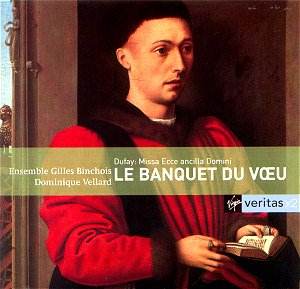DUFAY
Missa Ecce ancilla Domini; Proprium De angelis & Le
Banquet du Voeu (various composers)
 Ensemble Gilles
Binchois/Dominique Vellard
Ensemble Gilles
Binchois/Dominique Vellard
 Virgin Veritas
VBD 5 61818 2 3
[64.06+59.34]
Virgin Veritas
VBD 5 61818 2 3
[64.06+59.34]
Crotchet

This double CD gave great pleasure during a long drive through the Basque
mountains in Spain, whilst covering the
San Sebastian
Festival for
S&H. Modestly priced,
perhaps you should read no further - order these 1989/1992 re-issues and
enjoy!
However, once again I cannot forbear commenting upon presentation, which
is inadequate, as so often with such packaging. This programme is pleasantly
varied, rather in the manner that David Munro used to do in his concerts,
when we were becoming familiarised to medieval music. All the music comes
from mid-15th Century. To hook the prospective purchaser's interest, there
is a lot of historical speculation, laced with 'likely to have been performed'
- - 'not certain that it is indeed by Dufay', etc.
To take the second CD first, this is a marvellous Mass by the composer who
(ever since my involvement with Musica Reservata in the late '60s) always
seems to grab me as the best of his time. The Ordinary (Kyrie, Gloria, Credo,
Sanctus & Agnus Dei) is expanded with a Mass Proper (Introit, Gradual
etc) 'significantly related' by their underlying chants, Beata es
an elaboration of Ecce ancilla - that relationship, which will have
eluded most listeners, could have been clarified with a couple of music examples.
They 'may have formed part of a cycle for the Order of the Golden Fleece
established by Philip the Good of Burgundy', if that helps you? The same
good Philip held a huge banquet to vow destruction of the Great Turk. Outdoing
our familiar 4 & 20 blackbirds, who sang after being cooked, he had 'a
famous pie' on his table, which opened to reveal twenty-eight minstrels who,
we are invited to suppose, are singing some chansons of the time in four
entremets - groups of entertainments between the courses (the impeccable
1989 recording does not attempt to simulate the cheerful hubbub of a 15th
C. banquet!).
Those chosen to represent that occasion are by the ensemble's eponymous
Gilles Binchois and others. The words of medieval chansons
are fascinating in themselves and a mine of social background; unfortunately,
none are given with these CDs. The musicians are listed, many of the singers
doubling on instruments. You can usually work out approximately who is playing
what, but that can so easily and usefully be indicated with a system of coded
superscripts, taking up no extra space. Admittedly the words of the Mass
Ordinary are very familiar, but less so those of the Proper, which should
have been supplied, together with some basic information about Dufay and
Binchois, about whom we are told nothing.
Have no fears about the performances, which are impeccable, nor the recordings
made in France & Switzerland. Le Banquet du Voeu would make a
good contribution to the pauses between the courses of your next dinner party!
It would however be very interesting to learn from the record companies the
costs implications of the skimpy presentation so often imposed and executed,
sometimes unthinkingly, and not by musicians, so it would appear here.
If you welcome having these matters brought to your attention in MotW
& S&H, please send an email to
Len@musicweb-international.comor
peteralexa@aol.com to say so?
Peter Grahame Woolf

